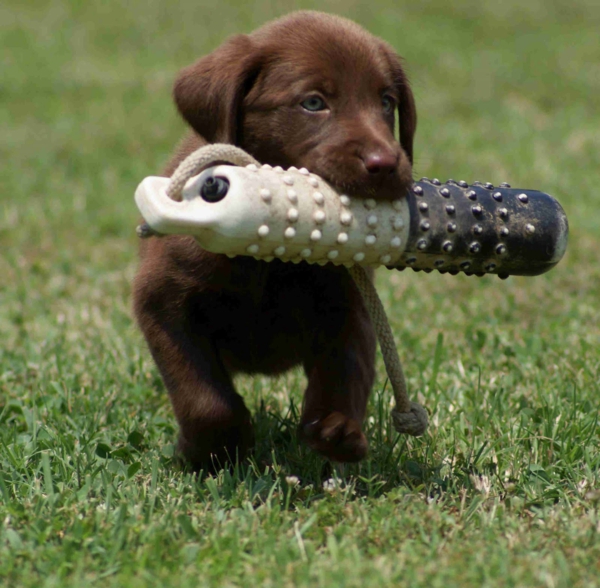Puppies are some of the cutest creatures on earth – but they can also be some of the most challenging creatures you might have in your life. You’ve got to housetrain your puppy, save all of your slippers from being chewed apart, teach your puppy not to jump on every person and surface, and hopefully end up with a dog who loves to listen to you. Potty training is usually top on the list of priorities for new dog owners – with good reason. Here are 8 housetraining tips that will help you raise a puppy you love to live with every day.

1. Crates Can Be Your Friend
I admit that many years ago when I got my first dog I thought crates were actually somewhat unkind. After all, my sweet little Cleo whined and cried liked she was being tortured. However, I soon learned that if I wanted to be able to spend 5 minutes alone I needed to have a way to confine her or I was forced to play – Where is that smell coming from? as I searched for the potty mess I knew she left me somewhere.
Crate train your puppy so she has a safe place to be alone. When crates are the right size (large enough in which to turn around, but not much larger), dogs will usually not soil in their crates. They consider these their dens and keep them clean.
2. Start with Small Spaces for Your Puppy
If you give your puppy free roam of every room in the house, chances are that you will find at least one unpleasant surprise somewhere. The first few weeks you have your puppy in your home, limit the physical space she has to wander, especially from carpeted areas. I like to use baby gates as they are not permanent (there are styles that don’t attach to the wall), they are safe for your puppy, and they still allow you to step over them and move about the house. You can gradually remove baby gates and barriers as your puppy begins to use the bathroom more predictably.
3. Use a Bathroom Routine
Puppies learn best when they can predict what will happen. Each morning the first thing you should do is take your puppy from her crate and take her outside on a leash to potty. Feed her breakfast and then make sure you take her outside again within 15-30 minutes. During the day your dog will need to use the bathroom more frequently than at night. Take her out as soon as she wakes from naps and before people come over to visit (she’ll likely get excited with new faces around).
4. Don’t Let Your Puppy Out to Potty Alone
Even if you have a fenced in yard you should accompany your puppy on bathroom breaks for several reasons.
- A leash allows you to guide your dog to the specific bathroom spot you want her to use – which will save on yard cleanup.
- When you take your dog to the bathroom spot she will eventually learn through scent markers and routine that this is the time and place to potty.
- Accompanying your dog on bathroom breaks means you can monitor your dog’s health – what comes out it an important indicator of what is going on inside your dog. If you have health concerns about your dog’s bathroom habits look at www.1stpetnaturals.com for descriptions on everything from constipation to diseases that can affect your dog.
5. Be Firm, Not Frightening, With Potty Training
There is a difference between firmly establishing house rules and raising a puppy that is anxious and fearful of owners who yell and are intimidating. Interrupt your puppy if she is having an accident in the house with a firm command such as “No, no” that will alert her that she is doing something unfavorable.
6. Offer Praise for Potty Success
Praise your puppy when she uses the bathroom outside in the designated area, and even offer a small treat such as a piece of her dog food. When she sees you are really excited about this accomplishment she’ll want to repeat it in the future.
7. Don’t Rub Her Nose In It
Dogs do not understand that the reason why their nose is being rubbed in the potty mess is because the mess is in the wrong location. This can be very confusing for the puppy and even cause anxiety about using the bathroom in general. Dogs have immediate reactions – if you yell at your dog or rub her nose in her mess even 1 minute after the accident she will feel she is being punished for whatever it was she was doing that instant – even if it was just lying down on the rug.
8. Clean the Mess Thoroughly
Puppies will make messes. They will also use scent markers to determine where to potty, so removing any trace of accidents in the house will help ensure that they don’t learn the corner in the living room is the bathroom. There are great cleaning products available that remove scents but don’t destroy surfaces.
Chris Oldenburg is a freelance writer, mother, and passionate pet owner. She recently wrote about how to relieve constipation in dogs and how to housetrain your puppy, topics that every pet owner needs to know. Chris loves to spend time with her family, dog Mya, and cats Mickey and Jewel and also makes time for her passion for writing and gardening.

